#development of civilization
Explore tagged Tumblr posts
Text
Popular BL Pairings in Non-BL K-Novels/Webtoons [MC Focus]
K-NOVELS
Omniscient Reader (Line Webtoon) [2018]
중독: Yu Junghyuk/Kim Dokja
그분독자: Secretive Plotter/Kim Dokja
Lout of the Count’s Family (Tappytoon) [2018]
최케: Choi Han/Cale Henituse
알케: Alver Crossman/Cale Henituse
My S-Class Hunters (Line Webtoon) [2018]
윻윶: Han Yuhyun/Han Yujin
현윶: Sung Hyunjae/Han Yujin
Return of the Blossoming Blade (Line Webtoon) [2019]
백청: Baek Cheon/Cheongmyeong
당청: Tang Bo/Cheongmyeong
The Greatest Estate Developer* (Line Webtoon) [2019]
하비로이: Javier Asrahan/Kim Suho
I Woke Up as the Villain (Tapas) [2019]
도진유성: Kim Dojin/Choi Yuseong
When the Third Wheel Strikes Back (Line Webtoon) [2020]
세드예서: Cedric Riester/Jung Yeseo
지브예서: Jibril Diop/Jung Yeseo
Debut or Die (Tapas) [2021]
앟문: Seon Ahyeon/Park Moondae
큰문: Lee Sejin (Keun)/Park Moondae
윶문: Cha Eugene/Park Moondae
랩문: Kim Raebin/Park Moondae
엋문: Cheongryeo/Park Moondae
Beacon of Light in the Dark Sea [2022]
해량무현: Shin Haeryang/Park Moohyun
재희무현: Kim Jaehee/Park Moohyun
The Hunter of the Other World is Being Misunderstood [2023]
창호기려: Kang Changho/Kim Kiryeo
하성기려: Jeong Haseong/Kim Kiryeo
Black Badger [2023]
윤힐: Choi Yoon/Hildebert Talev
예힐: Lee Yehyun/Hildebert Talev
Got Dropped Into a Ghost Story, Still Gotta Work [2024]
샇룻: Baek Saheon/Kim Soleum
솔샇: Kim Soleum/Baek Saheon
잫솔: Lee Jaheon/Kim Soleum
블솔: Braun/Kim Soleum
WEBTOONS
Tower of God [2010]
쿤밤: Khun Aguero Agnes/The 25th Bam
Lookism** [2014]
재열형석: Hong Jaeyeol/Park Hyungseok
No Home [2018]
은영해준: Baek Eunyoung/Goh Haejoon
Garbage Time [2019]
준상: Seong Junsu/Ki Sangho
뱅상: Park Byungchan/Ki Sangho
종상: Choi Jongsu/Ki Sangho
Special Civil Servant** [2024]
이든마루: Seonwoo Eden/Han Maru
*note: the MC has a canon relationship with another character.
**note: the MC has canon feelings for another character.
UPDATES
15/02/2025: Filled in the pairings for Black Badger.
25/02/2025: Added the KR name for Kim Dojin/Choi Yuseong.
11/04/2025: Changed the title of the post.
#omniscient reader's viewpoint#omniscent reader#lout of the count’s family#my s-class hunters#return of the blossoming blade#the greatest estate developer#i woke up as the villain#when the third wheel strikes back#debut or die#beacon of light in the dark sea#the hunter of the other world is being misunderstood#got dropped into a ghost story still gotta work#tower of god#lookism#no home#garbage time#special civil servant#joongdok#plotja#choicale#alcale#hjyj#yhyj#ahmoon#keunmoon#eotmoon#khunbam#jaydan#edenmaru
1K notes
·
View notes
Text

the tortoise and the hare
#parkour civilization#seavbo#someone made a reference to the fairytale and my frontal lobe developed#like why do they fit so well. Whats going on
2K notes
·
View notes
Text

not an uncommon idea to come across but I'm so fascinated by how much about this view of ancient history/culture/myth tradition is unintentionally & straightforwardly revealed by the phrase "and therefore the origin" here -- not just the assumption that these things exist in a strictly linear progression ("greece" exists then "rome" exists) where "greece" and "rome" are the only players (where does pre roman italy fit into this worldview? what room is there here for the influence of ancient north africa and west asia on greece? these places are effectively erased off the map), but the idea of greece as an "origin" of "art and mythology", that in greece it somehow developed whole cloth & completely undiluted by the sort of "cultural borrowing" they perceive the romans are doing. I always find this sort of view of greece as contextless & devoid of movement and trade until it comes time to pass the things they've apparently independently invented on to rome (or have it stolen as some would see it) frustrating, as well as the view of rome as a sort of copy pasted greece with no other influence or separate or preexisting traditions, really frustrating & honestly occasionally kind of sinister tbh
#some connection im my mind tbh btw the athenian obsession w autochthony & the way modern people see mythology civilization philosophy etc as#just essentially coming wholly formed out of the place of greece itself. but idk i don't have enough expertise to really develop this one#thoughts#sorry for essentially making this same post for the millionth time also it's just that everyday i see new people expressing this assumption
413 notes
·
View notes
Text
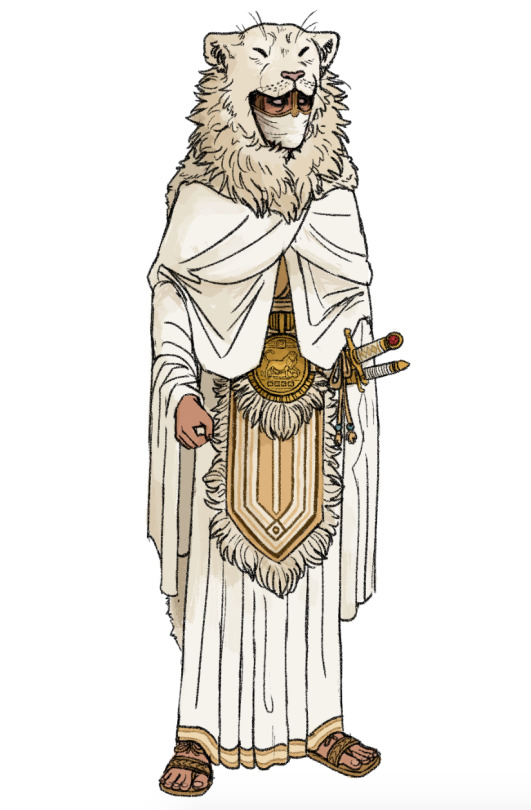
Here's what typical vestment for The Odomache looks like.
The pelt of the lion that was originally sacrificed and worn raw for her incarnation is retained throughout the years of service, preserved and fashioned into a headdress and cape (obscuring a helmet). This can get dreadfully hot in the summer but no one ever said that being a hollowed out pathway for God's spirit was easy.
The body is always obscured near completely, barring the hands, feet, and parts of the face (philosophically, these are the body's least vulnerable parts as its modes of Action, though this is in large part a practicality). This is partially a matter of psychological enforcement that this person is not Just a human, and partly a matter of protecting the part of God's living spirit that's in a wholly human body. Conceptually, the Odomache Enables tremendous power rather than being intrinsically powerful in of herself, so all manners of protecting the metaphysically vulnerable human body are of tantamount importance in her case.
The complete obscuring of any identifiable feminine form is also notably important to the underlying philosophies and biases involved. It is necessary that she is female, a condition ascribed a unique malleability to change and transformation (for good or harm), but the act of female/non-male sex and gender assignment also serves to uphold an underclass in a patriarchy that she By Necessity must be distanced from. This extends beyond the masculinized social and dress performance of Odonii to a masculinized social performance with dress that utterly obscures any part of the body that could be gendered, and dress that is not gendered in of itself (women do wear less revealing clothing than men and skirts of similar length, but the act of Fully covering the body in this form exists outside of the bounds of gendered dress).
[[It should be noted that on a historical level, this role is largely a descendant of a variety of 'celibate and/or masculinized female religious authority' figures in pre/proto-Wardi societies stretching back centuries, rather than an emergent property of contemporary religion and philosophy. This is an adaptation of older roles and worldviews to securely fit the contemporary zeitgeist, and that's part of why many aspects of this role Superficially clashes with said zeitgeist.]]
The relatively undecorated white cloak and robes in comparison to culturally favored displays of color and opulence further emphasizes a sense of the Odomache's separation from humanity. The Wardi image of God is not a human lord, but rather the world itself and the functions of the world distilled into the forms of animals. Human hierarchies exist Within God rather than God having a place within human hierarchies, so in this philosophy it's natural for this particular person of high authority to not closely resemble a Human Authority.
This is still ultimately a human body existing at the top end of a human hierarchy (and in the dimension of religious thought, it a human body holding aspects of God most specifically concerned with maintaining concepts of 'right' civilization and hierarchy), so public-facing garb like this will still include a few mundane trappings of lordship such as this fancy gold khattanocuy displaying an image of an enemy being trampled by the Face Odomache as the guardian lion. Purely ceremonial garb for the Odomache hides the body in its entirety beneath the white cloak and forgoes all decoration save for the obligatory weaponry.
A sword and dagger is worn at all times as a matter of being the ultimate physical bastion of her society's military might, and she is always accompanied by a retinue of 'lieutenants' (Extremely elite servants/squires) who carry whatever other elements of her perpetual armament are not currently in use. These weapons are Completely ceremonial in nature (to the point that they're made or plated with gold rather than anything like, durable) and there is absolutely zero expectation that the Odomache will ever directly engage in combat (the times this has happened historically have been when things have gone horribly wrong).
Her face is usually masked in public, though this is not a strict necessity of the role and is forgone for some ceremonial purposes. On these occasion, it's standard to paint the face red to still partly obscure human features in the same fashion of battlefield Odonii. As the color of blood, it positively evokes bodily vitality and strength, the living spirit of the world itself and the mode of connection to God (and will also be reminiscent of the rite of incarnation during which she is Actually covered in blood)

#When I'm talking about the philosophical angles here I'm referring to like. Mostly subconscious cultural outlooks#Like most people aren't thinking 'so she should wear plain clothing unlike a lord because God isn't a lord. But should still have Some#trappings of lordship since she's an authority figure' like most people will just read all this as natural to her role and not break it#down any further. The main exception being that most people would be directly conscious of the notion that her obscured body#is a manner of protection from the Gaze#Unrelated tags:#I think a lot about how if this was a real life historical civilization whose writing system was never decoded this would totally be#one where pop-history latches onto the notions of it having Woman Warriors or possibly even being A Matriarchy.#Because there would be tons of art of identifiably female figures carrying weapons and on battlefields and etc#and a deity(?) depicted as an anthropomorphic maned lion with sex characteristics made ambiguous via clothing but possibly being#connected to tons of other art of a visibly female (nipples) maned lion as a possible sovereignty deity trampling depictions of foreign#enemies. Like there'd be MORE than enough information in the broader sphere of its art for serious researchers to develop#fairly accurate takes but the pop culture angle would be soooooooooooo bad.#imperial wardin
210 notes
·
View notes
Text
I think what is most striking about siwolism being driven off the site is specifically how the black usamericans leading the harassment campaign treat the crime of genocide.
Namely, that they either wholly ignored siwolism's claim that the Korean war constituted a genocide (pretty solid claim, which I agree with) or outright denied that it was such.
What makes this interesting to me is how those same bloggers, and many of their followers, are strong supporters of black genocide histiographic theory. It's part of why they ran Nicole ratliker off the site. She criticized that narrative and said police brutality in the modern usa does not constitute a genocide.
Which, if you think police brutality or systemic anti black racism in general is genocide but ignore or excuse the participate of black usamerican soldiers in the Korean war genocide, you hold such wildly dissonant views that pretty much nothing you say should be taken seriously.
#which is one of the many reasons i think the black genocide framework is pretty much useless now#it was useful at the period it developed in (jim crow era civil rights activism)#but even then it wasnt particularly accurate to the term genocide#but from there it took on an almost conspiratorial view#especially wrt the use of black soldiers in vietnam and imprisonment rates#as examples of genocide
230 notes
·
View notes
Note
Wait, so it Perceptor was Shockwave's caretaker...does that mean Shockwave was a lil guy like Bee at some point?(asking cuz I thought I saw a handle on Shockwave's back like the one Bumblebee had when he was a sparkling)
You saw right! In this au they started farming protoforms when they were incomplete during the imperial era in order to mass produce warframes. Shockwave being one of those 'incomplete' protoforms.

Newly born baby. The handle started turning down when he got older because otherwise Perceptor wouldn't be able to grab it.
#crispy answers#my art#tfa#shockwave#transformers sparklings#HE GIVES ME THE WORST CUTENESS AGGRESSION EVER#Older mechs like Alpha Trion didn't have a sparkling phase because he was protoformed as an adult#It didn't become default to have under developed cybertronians until the civil war#“Under developed” = Sparklings btw
140 notes
·
View notes
Text
I want a shirt that says “HOMER WAS A WOMAN”
#well technically I prefer to believe that homer was a collection of poets#if anything the name homer is a metaphor for the thousands of years of mythology that has grown and developed with civilization that only—#—the traces of remain#but ‘HOMER IS THE COLLECTIVE SUBCONSCIOUS AND A METAPHOR FOR STORYTELLING THROUGHOUT HUMANITY’S HISTORY’ is a little long#I love you the homeric question#the poets known as homer you will always be famous#in your own anonymous way of course#homer#greek mythology#the iliad#the odyssey#tagamemnon
103 notes
·
View notes
Text
I do not know how to describe this really, but Excalibur in Arthur's hands is a weapon. In Merlin's hands, it's a tool. Like Merlin uses it to knock over the cup of life, not to slain Morgause. Merlin is regularly using it to help him stand, to help him get back on his feet. Arthur uses it to kill, just to kill. Not that that's a bad thing but he's regularly putting it down before he does anything not to do with battle. Even when Merlin uses it to kill Morgana, it's just a tool to be used not a way to kill someone. Idk if that makes any sense, but it's something I noticed in the way they wield it even despite Merlin knowing how powerful it truly is. And I think it says a lot about their character.
#bbc merlin#merlin#bbc arthur#headcanon#I just think its interesting#Blah blah blah something about how Merlin was raised by a Mom in a village and Arthur was raised by a knight and king#Causing them to have very different relationships with how they treat swords and acts of violence in general#Arthur treating it with civility and honor#Merlin using it as a means to an end#Still#I just can't get over this show#I probs never will#Like the character development shown in the little things#god
54 notes
·
View notes
Text
Chapter 57 Cope Posting
Not like this, dear void... not like this. The blessing/curse of Kagurabachi chapters ending in 7 being absolute banger cliffhangers continues and there is not enough copium in the world to get me through to next week. This entry is an absolute mess...
Let's start with practicing on the editor's comments again. Sorry if the colours are hard to read on brighter backgrounds, I live in Dark Mode as much as possible.
First page: ハクリが飛宗の転送に成功! そ���て- [Hakuri ga Tobimune no tensou ni seikou! Soshite-, Hakuri successfully transfers Tobimune! And then-] Last page: 座村, 漆羽… 事態は混沌へ… [Samura, Uruha... jitai ha konton he..., Samura, Uruha... the situation turns chaotic...] noting that the word used for "situation", jitai (事態), specifically has negative connotations (as opposed to 状況 [joukyou], which is neutral).
These comments are rarely more than fluff just to give the editors some presence in the work itself, so I don't take them as definite indicators of anything going on in the plot. But man. Man. "Bad situation" seems to be putting it lightly. I was ready to take you off the list of possible traitors, Samura! I was seriously going to do it! Whyyyyyyyyyyy
Chihiro and the Pink Menace
Fine, first up... school?
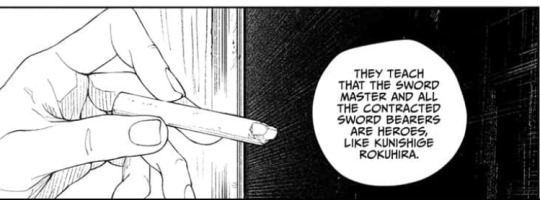
How does our cast stack up to the average student after getting home schooled in murder and cool action poses?
It was obvious to everyone that this arc would involve Chihiro learning about the unpleasant sides of his dad's legacy. So this is just a "hey don't forget" moment for us that also highlights how far removed Hiruhiko and Chihiro are from regular society. Those two (and Hakuri) should be in their last year of high school, complaining about homework or stressing about their future college/job plans right now instead of fighting to the death. Poor guys.
I don't want to presume too much about Hokazono-sensei's views, but I really like directly acknowledging that winners write history and so their wartime cruelty is often downplayed or re-framed as heroism. These kids and even Chihiro only know the revised version of what happened, not the truth of the matter.

Home schooled Chihiro confirmed! Kinda!
Anyway, some more John Plan Reveal. He wants Chihiro to learn the truth about his father's legacy and the impact it's had- that's why he hasn't been "harvested" yet. This implies that there's some terrible thing that could upend Chihiro's entire worldview to be learned. But we kind of already knew that based on everything I just said.
I hope this isn't a flag for John trying to convince Chihiro to join him. There are awful secrets that are going to be unearthed about Kunishige and the Kamunabi this arc for sure, but it's kind of a waste of our time to do the "oooh it was worse than you thought why don't you join us to set things right" rigamarole.
Obviously the Hishaku have some compelling reasons to do all this if they can get someone as loath to kill as Samura on their side to murk his war buddies. It's just never gonna convince Chihiro so I hope we don't get a moralizing yapfest to accompany John's outstretched hand. I trust the writing though! So far it's been almost nothing but excellence so... chill, me. Just wait and see.
I think that no matter what happens Chihiro will continue to forge his own path with allies who care for him at his side. He won't choose the government's path, or the Hishaku's, or even his dad's- he'll create something new. Standard stuff for a shounen series but I never get tired of seeing it!
Before moving on to the coping session, there's something neat in this scene that I want to ramble about:
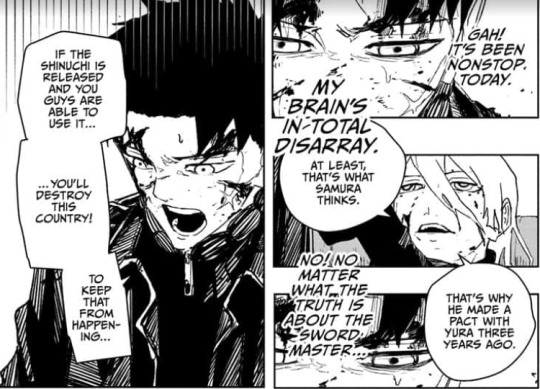
Local yapper yaps while the guy listening to him literally overthinks
I'll use the JP version if I have to, but I like how Chihiro's inner monologue deliberately overruns Hiruhiko's speech bubble to show that he's not paying full attention while his thoughts are in overdrive. He's still partially listening but he's not quite as composed as he appears to be on the outside, which is confirmed by the close-up zoom into his stressed look with the sweat drops. Yet when we zoom out, he seems a bit more put-together like usual. He's still exhausted from yesterday, man! Really should have rested up... at least the author acknowledges it. (Forced bed rest soon? Hopefully?)
This is how Hiruhiko was able to get the drop on Chihiro. Chihiro's got a lot on his mind and he has trouble focusing, just like Uruha chided him for on the train. His resolve is unshaken but he's still prone to wavering in the moment as he tries to process things. He even misses the fist time Samura's name was mentioned! Clearly Chihiro needs Hakuri or Uruha or someone there to yell encouragement at the right time to stop him from getting lost in his own head. But he's got a lot to think about and work through right now, so it's understandable why he's so stressed out.
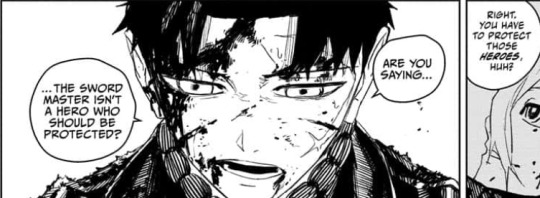
Poor Chihiro. He's coming to the conclusions that we, the readers privileged with having weeks IRL to ponder new information, came to long ago. The Master is not treated like a hero but a prisoner, and probably for very, very good reasons. Ones good enough to convince Samura to make a deal with the devil.
What Actually Happened?!
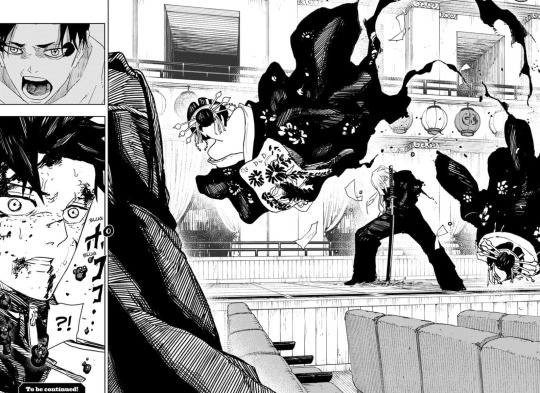
Not all the blades have themes from nature, it seems. Geisha offered many different types of entertainment to guests, from performing music to conversation to serving sake. So now we have the idea behind the name [Swaying Sake]!
First up to delay just a little longer: Kumeyuri power reveal! Seems to be based in some kind of performing arts aesthetic with the geisha that were conjured. Fitting for the guy who wears kabuki eye make-up right? ...And for the next bearer, who interrupted a kabuki performance to pick it up in a theater... I see you and your foreshadowing, Hokazono-sensei.
Fine. I'll admit it. The ending of the chapter makes it crystal clear that Hiruhiko is the new bearer contracted to Kumeyuri by having his origami butterflies come undone as he grasps the hilt in his teeth. Can't even hope it's another case of someone "borrowing" power like Kyora did with the Shinuchi of the bunch.
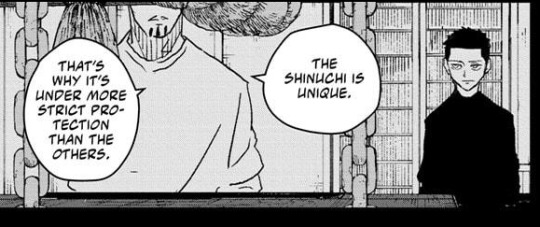
Magatsumi's the only blade that can be used by someone not contracted to it, hence the extra protections it needed.
So that means... yeah. Uruha's gone. Just like that.
There will be thousands of theories about what exactly happened to Uruha, why Samura made a deal with John, what the details of that deal were- we'll get the truth soon. I'm most interested in the reasoning that ties into Samura's sincere beliefs of killing being an evil act.
The burden of death weighs so heavily on him that he blinded himself in penance. But he's willing to let his own apprentice die -probably even kill him himself!- because of... what? What was so horrible about fighting with the Master and Kunishige's weapons for the good of the nation? What compelled him to help the Hishaku kill the remaining bearers and upend the peace they earned?!
Hey, Samura. Is it really so bad to be called a war hero while being treated like a prisoner in a comfortable government-provided jail facility? Is it so horrible that "alternative facts" pass for real history to bury whatever horrors you witnessed and possibly perpetrated? Is it truly awful to have people willing to die for you despite all the grave sins you've committed? That they're likely completely unaware of thanks to government propaganda and being too young to have witnessed the truth?
...I need those Seitei War flashbacks pronto.
*----------------------------------------------------------------------------*
Wait a minute. Jail? Even the friggin' onsen?
Yup! The Master's the only one being treated like a dangerous criminal outright, but the 慚箱 [sanso] are just dressed up prisons for the Bearers. The Kamunabi ain't even subtle about it.
慚 [san] - to feel shame 箱 [sou] - box
The government put these guys in specially-constructed (or repurposed) buildings officially referred to as "shame boxes" and told them they couldn't leave. Even the name given to one of them is a bit much! 国獄温泉 [Kokugoku Onsen] translates to:
国 [koku]- country/state/national government 獄 [goku]- jail/prison 温泉 [onsen] - hot spring
Gee, I wonder if Uruha was having a good time at State Prison Hot Springs?
That said, while there may well be some bitterness between the Bearers and the Kamunabi, it's not the main motivating factor for Samura. His is definitely rooted in how they all acted during the war and how guilty he feels now that they're promoted as heroes.
*----------------------------------------------------------------------------*
It looks like Chihiro's being summoned by Hakuri in the very last panel so we might get some perspective on Samura's reasoning next week. Probably no clear answers right away, but at least enough to see if he really was the one who killed Uruha and a bit of insight into why. And to see if Uruha's dead at all... I mean, if we don't see a body... let me be delusional, okay?!
I'm just not able to go all-in on believing Uruha's dead. But it's not because I don't think he actually is... it just doesn't feel real after spending weeks preparing to let go of Samura. Not to mention the tried-and-true tactic of baiting out strong emotions with implied character deaths.
Normally I don't take death foreshadowing like this too seriously in shounen series. I just wait to see if the author is faking me out or not before getting stressed (unless it's Hakuri, in which case I stress responsibly). But Kagurabachi is a series that lured the MC with a child's severed leg and showed two suicide attempts on-screen, one of which was horrifically successful- right in front of someone who was already traumatized too. Hell we lost most of the anti-Kuregumo squad without much fanfare back in the Sojo arc! Only actually showing a child being tortured on-screen is too much, apparently. This series is dark as hell when the author wants it to be and Uruha's death is probably another one of those times.
There's hope in me that Uruha can still come out of this alive just because I like him so much, but I want the author to follow through on his death when it's presented as such an ominously real scenario. All signs point to Uruha being a goner, so don't make it look iron-clad then say "nah" the next chapter with some technicality that we couldn't have known about until the reveal. I would rather lose Uruha in an unexpectedly painful way than be faked out just to get the reaction out of me, y'know? Don't toy with me. Commit to crushing my heart, dammit.
But, God... oh man. I fell for the bait and got stupidly attached to a Bearer in the arc named after killing them. I even knew bad times were coming because of all the levity at the start of the arc but still went on hoping nothing would happen so soon. Laugh at me, I deserve it. I probably helped this manifest by mentioning how awful it would be if Chihiro found out a Bearer died because Hiruhiko was able to contract with one of the blades. Saying "I crave the angst that will come from this situation with every fiber of my being" in a post tag was overkill. It's just:
Author: names the arc after assassinating the bearers
Reader: gets attached anyway
Author: assassinates a bearer
Reader: ╚(•⌂•)╝
Coping Theory
May as well put my two cents in on how it could have gone down while I'm here...
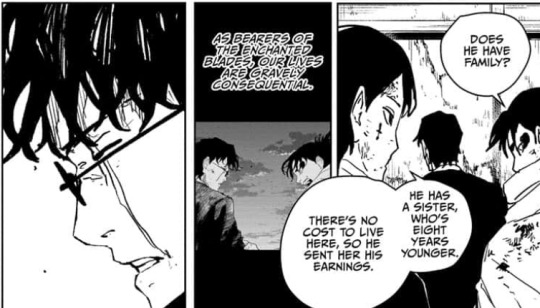
I wonder if he planned to die in the raid instead so it looked like an unavoidable accident, sparing everyone else from the carnage.
This exact sequence- the Makizumi talking about honor in death for saving Samura, and Uruha's words that the Bearer's lives need to be valued above others'- is what solidifies Samura's resolve. This man is filled to the brim with guilt and self-loathing (much like another swordsman we know). He cannot save himself, but... perhaps he can take some equally bad sinners down with him for the greater good. He's not only a mirror for Hakuri, but Chihiro as well- one's resolve to save no matter the cost to one's self, and one's resolve to go to hell for what they believe is right. That's how I'm reading this until we get his own insight on the matter, at least.
It's not a stretch to infer that Samura thinks the Bearers are better off dead in large part due to the powers they command and things that were done during the war. That's still a huge mystery to be unraveled but I mean:
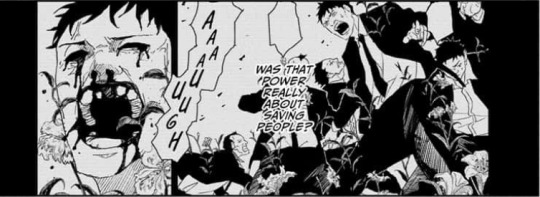
Seeing the bare minimum of Magatsumi in action really drives home how horrific these "heroes" could seem out on the battle field doesn't it? No wonder the clone sorcerer described the Seitei war as "hell on earth". But the public has no knowledge of this. They only got the sanitized version fit for PR purposes and feel-good stories.
The Hishaku seem to be intent on dismantling this image. Perhaps that's how they got Samura on their side? Not sure how the current Bearers dying and giving the Hishaku access to that dreadful power is better than the status quo, but that's something that will become clear with more reveals about the ideology driving the group. Maybe Samura doesn't care so much about the rest of the world and just wants to do what's best for the truth that's been buried under nearly two decade's worth of secrecy.
As to what happened with Uruha... two things come to mind. One I think is more likely, and one I want to cling to until it's ripped away as I sob and beg for just one little bit of comfort.
Most likely, I think Samura and Uruha had an exchange about ideals and the value of their lives. Samura overpowered Uruha per the plan as the "trump card" and that was that.
In delulu land, I want Samura to have been double-crossed. As in he made a deal on the condition that the lives of the people he cared about would be spared, but of course Uruha couldn't be allowed to live. So the Hishaku ensured that he'd die there no matter what. It's a bunk theory since Mr. Hatshaku left once the situation turned against him... maybe incorporate some of the datenseki mind control stuff in there somehow? I don't know. Just let me have this until canon proves otherwise.
Hakuri and Chihiro, Though?! And Miscellaneous Questions
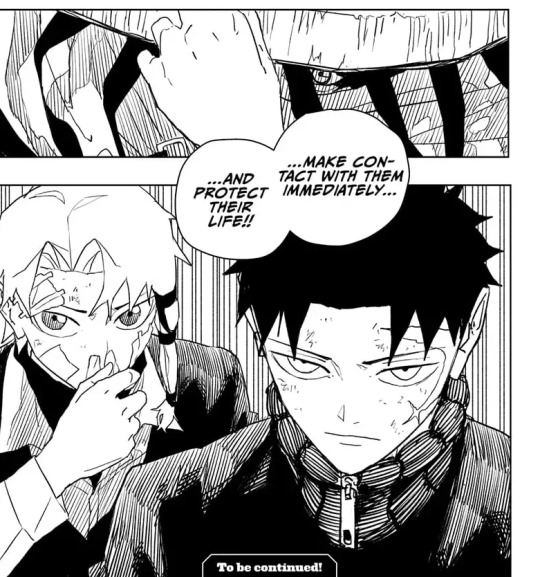
(Ch. 46) I'm not going to be okay for a while and neither are they.
Best boys are really gonna go through it no matter what Chihiro is summoned back to. They'll be in a rough way... not only did they lose Uruha and hand Kumeyuri to Hiruhiko, but Samura betrayed them all... oof. So much for proving themselves to the Kamunabi. They're going to get an earful and be set back in the "negotiations" big time.
No doubt Chihiro will put this burden on his shoulders too, even if no one could have predicted Samura's defection to the enemy. It's his dad's legacy that's causing all this strife right now. He'll be more motivated than ever to unravel the war's true history and I'll be right there with him hoping he doesn't push himself too hard or harshly. The son shouldn't be responsible for the sins his father committed before he was even born. But that's just like, my opinion, man.
Meanwhile...
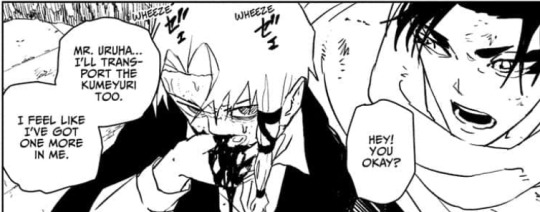
"I'm still good for it," wheezes the guy with blood gushing out of his nose at an alarming rate.
Hakuri will probably blame himself too. Depending on how things shake out, it could be for anything from accidentally arming a traitor to seeing someone die in front of him again. There's a good chance he'll (temporarily) lose the thing that makes him useful too, so that'll be an extra layer of angst for him to deal with. What value does a broken tool that couldn't fulfill it's one purpose have?
I also wonder what prompted Hakuri to summon Chihiro away from Hiruhiko. He's kind of in rough shape to do it just 'cause he misses his (boy)friend. They have cell phones to communicate with so it seems a bit abrupt to summon him back without checking first. Hakuri's also not the type to impose on someone to protect him. Nor is he the type to drop Chihiro into the middle of a life-or-death situation without a sense of mutual understanding first. So there had to be some kind of pressing need. The timeline of events means he's summoning Chihiro right after Uruha was killed, so... more soulmate stuff maybe? Their souls call out to each other and resonate when they're in distress, after all (it's canon baybeeeeee). They're in perfect harmony and all that. Sorry for the shipping nonsense I just need any bit of fluff I can get right now.
So many questions that might not get answered...
What about the Makizumi? Will they defect to serve Samura? Or will they try to help get Hakuri to safety with the Kamunabi? Samura doesn't want to kill them at all so no matter what happens they'll live at least. Hooray an elite squad that didn't bite the dust... (I think they will choose Samura because of everything he did for them).
How did Hiruhiko know when Kumeyuri was usable anyway?! Was it some signal from his mystery supporter that was lurking outside the window? And who was that- did Worst Jeanist show up?
Samura's loath to kill innocents, but does Hakuri count as one? Would losing his sorcery be enough to count him as neutralized for the Hishaku's purposes? Was exhausting Hakuri the main reason why Hiruhiko sent all the forces to the temple in the first place?
Hiruhiko wasn't surprised to see Tobimune disappear, so the Hishaku probably know about Hakuri's power. Their mole within the Kamunabi should get a bonus for the turnaround time on learning that bit of info and sending it on. Unless John's playing 5D chess and knew about Hakuri's awakening and team-up with Chihiro before they even met the Kamunabi anyway... perhaps even orchestrated it too... that would definitely need a very good explanation.
Alright. Okay. Let's wait on tenterhooks together, dear void. No waterworks until they show the body, got it?
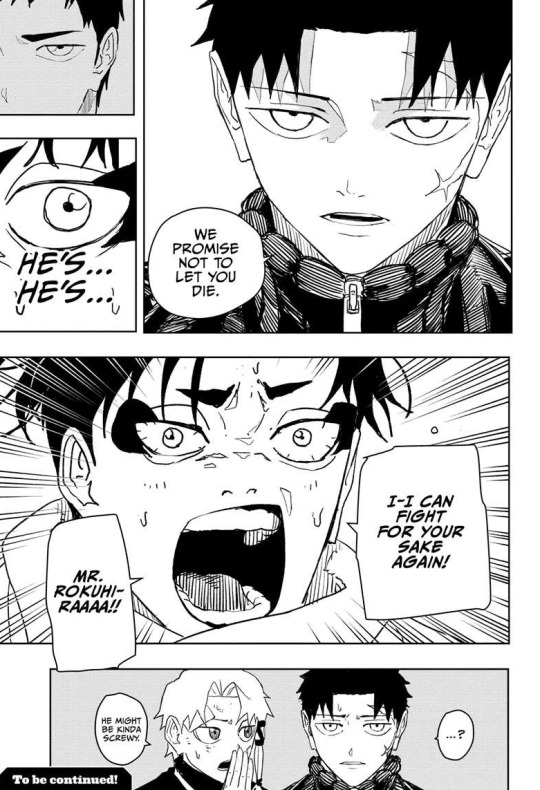
[sob]
#kagurabachi#long post#More convinced than ever that the Seitei War was a civil war#Saving the Hakuri Development Arc prospects yap for another chapter or two to see exactly how all this plays out#But I think he'll be finding his own path between Samura Uruha and his family's just like Chihiro#Uruha... not like this...
45 notes
·
View notes
Text
Hey, I get that you don't like that person's stance, but they don't deserve to die or to relive their own trauma because of it. Don't dehumanize your enemies.
If you're at the point where the most substantial thing you could say to somebody is a threat, just silently wish the best for them.
Wish that someday they'll stop being an enemy. Wish for character growth.
(Note: This is not asking you to "fix them." That's not your job, and helping people with the mindset of "fixing them" is not actually that helpful. If they ask for civil discussion-- and are genuine-- then it's your choice whether you permit it or not, but don't try to force your point without listening to them. Don't "fix them." It very likely is not going to work, and will very likely instead give them a bad/worse taste in their mouth about you and what you represent. Sometimes it is best to leave people be, in all honesty. You don't have to save the world, doing what you can is perfectly acceptable. Promoting good-will and stability in your own space is just as-- if not more-- important as stepping outside of said space.)
#self help#okay im going to crosstag this with several charged matters. i really hope people dont completely miss the point of this#yes this will reach some of the people you may not like. if you see them in the comments consider it practice. no “kys”. you got this#discourse#civil discourse#shipcourse#tme/tma#fandom discourse#feminism#endogenic#liomogai#radinclus#radqueer#antiship#proship#transandrophobia#transid#syscourse#by the way youre not a shitty person if youve threatened people. i get the anger sometimes. just recognize that you fucked up and do better#character development is possible for you too. its possible for everyone if they want to do it.
43 notes
·
View notes
Text

"Destroy what destroys you"
165 notes
·
View notes
Text
Crack theory time but what if Scavengers were actually the ones who were designed to be pets, and not lizards?
They're colorful and full of variation and personality, likely smart enough to play with a kid and use tools but not really enough to hurt anybody
They obviously have evolved outside of this niche, but I think it's why they look and act like that
#textadactyl#scavengers that we know have obv come a very long way#their intelligence turning from being smart enough to play with (along the likes of a border collie)#to developing budding language and writing and aspects of very very early civilization#scavenger#shit I made up
41 notes
·
View notes
Text
Oh wait i actually think the reason why demon's souls and bloodborne have the same vibes for me (aside from bloodborne being originally intended as a DeS sequel) is that they both seem to be so much... smaller? In scale? In elden ring and dark souls you have gods, and those larger than life mythological but also historical figures that are the responsible of most of the world's problems because they quite literally had the possibility to manipulate the fabric of reality in itself. With bloodborne and demon's souls, instead, the (called like this in both games) scourges are caused by normal, ordinary humans who didn't know they were actually living in a fantasy world and started the apocalypse because they fucked too much with powers beyond their comprehension.
#lowkey think des did the cosmic horror better bcs you can only lull the old one and not fight/kill it but eeh#anyways brainvomit why they sound so similar#there is also the whole ->actually this grave fucking with reality from people who cannot handle it#has caused another pseudoapocalypse before#with the first scourge in DeS and the pthumerians/loran in BB....#now i wonder if also the pthumerians very early in development when bb was still des2 were supposed to be#another one of those populations who heavily relied on the souls arts and got bitten badly for it#the whole 'peculiar inhuman looking civilization that lives in complicated labyrinths' does sound#like one of DeS' Fantasy Races (tm)...
19 notes
·
View notes
Text
someone just shot in the head a high profile politician that was very openly against our leftist president...this country is about to go even more to shit
#the president has been Not Good in general and this is just the cherry on top#it's giving época de la violencia#godos contra liberales#not to be dramatic but im scared shitless this is going to develop into a civil war#colombia#lune talks#tw shooting#tw gun violence
16 notes
·
View notes
Quote
Civilization could not exist without tremors of desire and without the counteracting, negation force of disciplined denial. Nor would the gyratory pulsations of a lively civilization exist devoid of the convulsive chemistry of union and repellency. We are born with a desire to be immortal. Cursed with the knowledge that we must die, people live their orthodox lives out by displaying reckless abandon as to the outcome of human life or nervously hounded by utter despondency nipping their heels. How we resolve this decidedly human complex of carrying out our daily lives while burden by our inescapable mortality determines our essential character. The collation of similar values adopted by our community determines who we are as a people.
Kilroy J. Oldster
#quotes#Kilroy J. Oldster#thepersonalwords#literature#life quotes#prose#lit#spilled ink#attitude#attitude-quotes#attitude-toward-life#attraction#attraction-quotes#character#civilization#culture-and-attitude#culture-identity#denial#desire#desires#desires-and-dreams#desires-quotes#existence#existentialism#immortality#personal-development#philosophy-of-life#self-discipline
12 notes
·
View notes
Text
ngl I think Sam should've been more involved in Civil War
abject utter rambling under the cut, this is not one of my clean posts this is brain spaghetti on the wall
mostly because it's hard for me to separate Steve and Bucky from Sam, they're hopelessly tangled up in each other thank you very much and I needed more of that from canon
I mean yes I think the final fight between Steve, Bucky, and Tony is beyond my skill to rewrite with Sam in it bc there's something powerful about Steve choosing Bucky over Tony as completely and irrevocably as he did, but on the other hand while it used to be Steve and Bucky against the world now it's Steve, Bucky, and Sam against the world, Sam literally shows up for Steve days after meeting him for the first time, lets him in his house when he's being chased by the government and does some illegal stuff to help him on his mission, but then he also dedicates himself to finding Bucky (assuming I'm remembering that right ??? I hope I am and that's not just fandom brain lmao)
and as moving as it is to see again that Steve still trusts Bucky with himself, I could've done with more of Sam learning to trust Bucky, more of a journey from he's not the kind you save, he's the kind you stop to really understanding what Bucky's been through, how it messes with his mind when the code words are used on him, and maybe Sam doesn't rest at quite the level of trust Steve does but this is the guy that pulled Steve out of a river, this is a guy whose autonomy is fragile, who's trying to rebuild some kind of life for himself, and they keep bickering but we get to see a deeper emotional bond forming between them
maybe Sam wonders where his place is with them, they've known each other longer than most people have been alive and literally nothing can come between them, but he's not between them he's with them, maybe Bucky shields him from an attack with his metal arm, puts his body between Sam and danger like he would with Steve, and Sam starts to realize that he's not a third wheel at all, he already knows Steve trusts and respects him and will turn to him for help before anyone else but he also catches a glimpse of Bucky's feelings for him, what are those feelings? even Bucky's not sure, is it just wanting to protect this person because Steve cares about him, is it just gratitude for being a facilitator in him and Steve starting to knit back together, is it abject wonder at the knowledge that this man has put himself on the line for Bucky (is that just wanting to protect this person because Steve cares about him? is it just repaying the favor from when Bucky pulled Steve out of the river when Sam couldn't get to him?) because nobody but Steve has ever really risked themself for him
just imagine how much sicker the shot would be of them sharing the shield if it was the three of them
imagine instead of Bucky trying to parkour his way out of the facility, Sam tried to fly him out, holding his hands or clutching his waist and maybe griping about how heavy he is a little bit a la Michiru and Haruka but trying so hard to get him out of there before he's killed, and it's not just the roof Tony breaks it's also Sam's wings, he and Bucky spiral back to the ground and Bucky twists them in the air to take the brunt of the landing because he knows he's better able to handle that kind of an impact
when they walk away, they're supporting Bucky between them, Steve has chosen him over the rest of his life except Sam and Sam has fully decided that wherever it goes, he's cashing his chips in with the two of them, he's choosing to stand by Steve in his love of Bucky and he's choosing to stand by Bucky for his own sake
because this movie was never just about the Avengers tearing themselves apart, it was always about Steve and Bucky coming back together, trying to find a way their lives still fit, choosing each other over pain and self-doubt and the government and the Avengers, and it could be about Steve and Bucky and Sam figuring out their places in each other's lives, where do I belong when they've been together since childhood, where do I belong when he's made a new connection without me, where do I belong except with the love I've had all my life and the love I've found lately, where does any one of them belong if not with the other two
it's Steve's undying love for Bucky and his wonder if Bucky still loves him, he knows Bucky remembers him but does he still feel anything? balanced with his new relationship with Sam, a little less hard-won but strong and so precious to him, he trusts this man with his life and the life of the other person he loves most
it's Sam's wholehearted love for Steve and his gradual understanding that loving Bucky has made Steve who he is, that Bucky and Steve are too entwined to separate them into different boxes, it's his realization that you can't love one and not the other, not these two, because they're already holding parts of each other inside of them, and his willingness to defend Bucky because there's a bit of Steve in him that leads to the genesis of loving Bucky for his own merits
it's Bucky's journey back to himself, anchored by the one person he loved when he was himself last, dragged and helped by the person Steve loves now, not knowing if he still belongs but wanting so badly to try, ready to put his life on the line for either of them because they've done the same for him when he doesn't feel he deserves it and yet desperate to live because he has them to do it with
that's the Civil War I've got in my brain, idk
#HELP ME RHONDA#I dont' know why on EARTH in the year of our lord 2024 I'm still thinking so hard about these guys#MAYBE IT'S BECAUSE THEY WERE IN LOVE AND MARVEL WAS A BUNCH OF COWARDLY BASTARDS#but the more I think about it the more I'm pissed that while the three of them were a team in civil war#there wasn't nearly enough interpersonal development with the three of them#particularly sam and Bucky their relationship can stay a little sharp but for heaven's sake there's something deeper behind it all#sam and Steve already have a bond and Steve and Bucky already have a bond#but this movie could've been the Polycule Movie where the three of them Became Something as a collective#I'm so sorry#samstevebucky#samsteve#sambucky#stucky#sam wilson#Bucky barnes#Steve rogers#captain America civil war#captain america#martianbugsbunny ships
41 notes
·
View notes